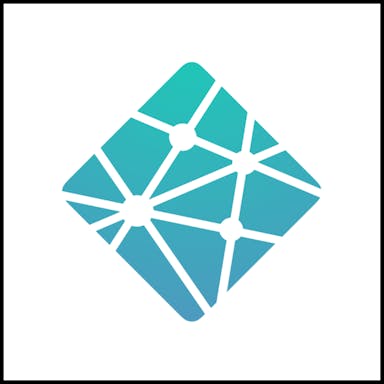Thesis
When potential customers visit static, generalized websites of B2B companies, they might not quickly or easily understand why the product is great for them. This could happen because prospects from different industries and company sizes have varying needs and look for different types of visuals, messaging, testimonials, or social proof. According to Hubspot, the average bounce rate falls between 26-70%, with the optimal range being 26-40% as of January 2022.
As a website visitor’s attention span decreases and the availability of alternatives increases, personalization becomes essential to raising awareness, increasing conversion, and growing revenue. Mutiny is an AI web conversion platform that enables companies to dynamically customize the website’s copy, visuals, and call-to-actions to match the visitor’s profile to increase the product’s appeal. Its no-code editor empowers B2B marketers to take control of the web conversion, eliminating the need for a dedicated growth team to drive results. What takes marketing teams months to accomplish is now condensed into minutes.
Founding Story
Mutiny co-founders Jaleh Rezaei (CEO) and Nikhil Mathew (CTO) initially met while working at Gusto before founding Mutiny in 2018. Before Gusto, Rezaei had been the Director of Product Marketing at VMware, while Mathew was the cofounder at LiveGit, a music collaboration tool.
At Gusto, Rezaei played a crucial role in helping its revenue grow 100x and decreasing CAC payback from 20 months to 10-12 months. Mathew was an engineering lead for the infrastructure team and built an in-house auto-scaling cluster for running tests, deployments, and production workloads.
In her role at Gusto, Rezaei was having difficulty building a comprehensive website optimization system from scratch. She knew other businesses faced the same problem and recruited Mathew to figure out how to take what they were doing at Gusto and turn it into a no-code platform for other companies. Mutiny officially launched in 2018 before being accepted into Y Combinator’s S18 cohort, and was able to release its first MVP within 2 weeks.
Product
Mutiny’s product is a platform for website optimization, experimentation, and personalization to increase conversion. Users can design, monitor, and manage their tests all within the Mutiny interface. Companies have to add Javascript to their website to get started and define their website conversion events in Mutiny’s editor.
No-Code Editor
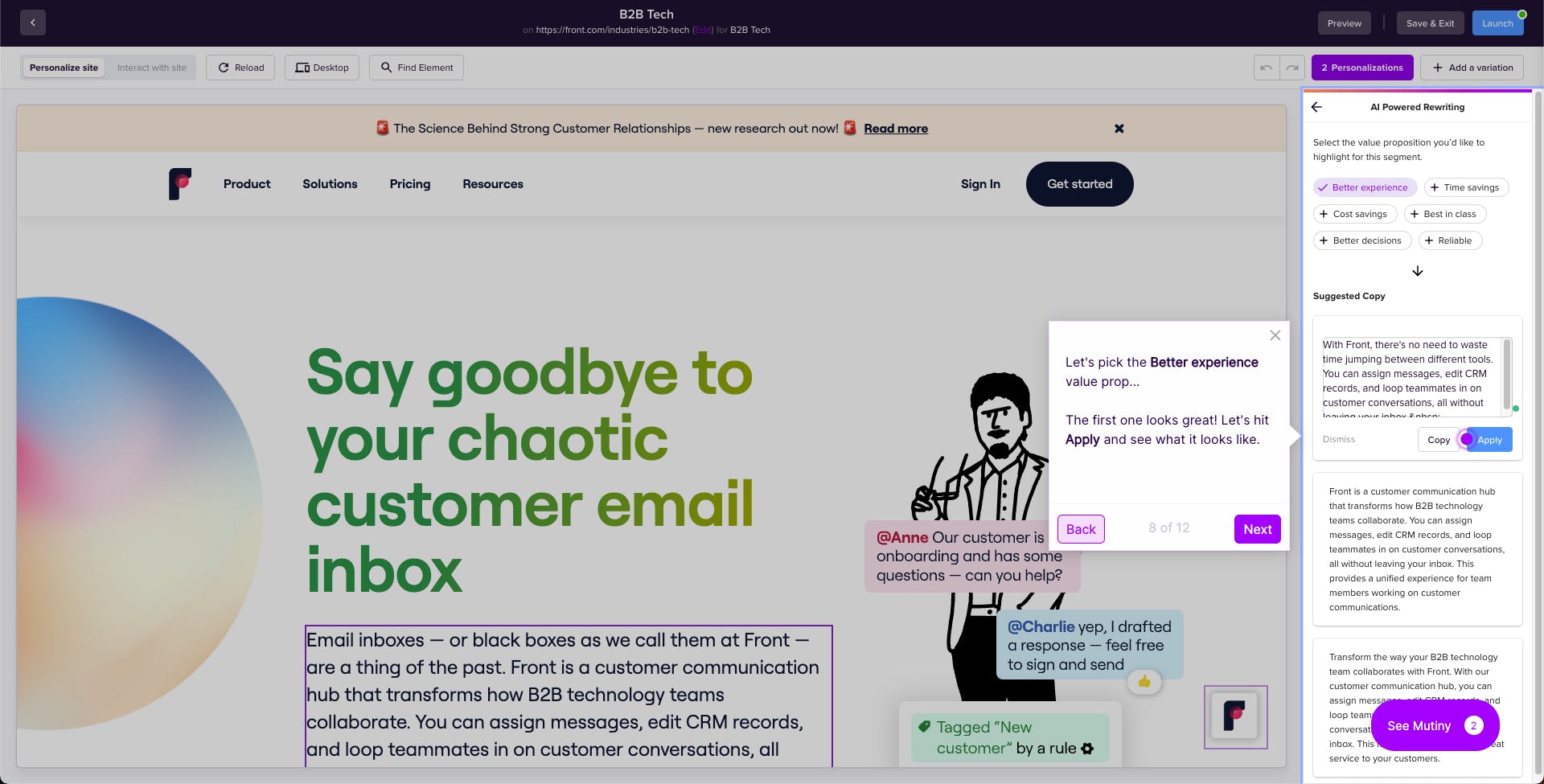
Source: Mutiny
For marketers, it’s often necessary to be able to quickly make changes to a website, but many marketers lack the technical skills needed. Mutiny's no-code editor empowers B2B marketers to easily make website changes without designer and developer support and helps measure results.
It also uses GPT-3 (Generative Pre-trained Transformer) to help marketers craft targeted messages for each customer segment quickly. When combined with short launch times, businesses can see faster conversions while utilizing a single cost-effective solution.
Customer Segment Analysis
Companies feed their marketing data into Mutiny from tools like Salesforce, Clearbit, 6sense, Hubspot, Marketo, Segment, Outreach, and Google Ads. A combination of injected data, manual inputs, and Mutiny's platform data enables customers to choose from 300 attributes to get insights into known target segments and discover new target segments.
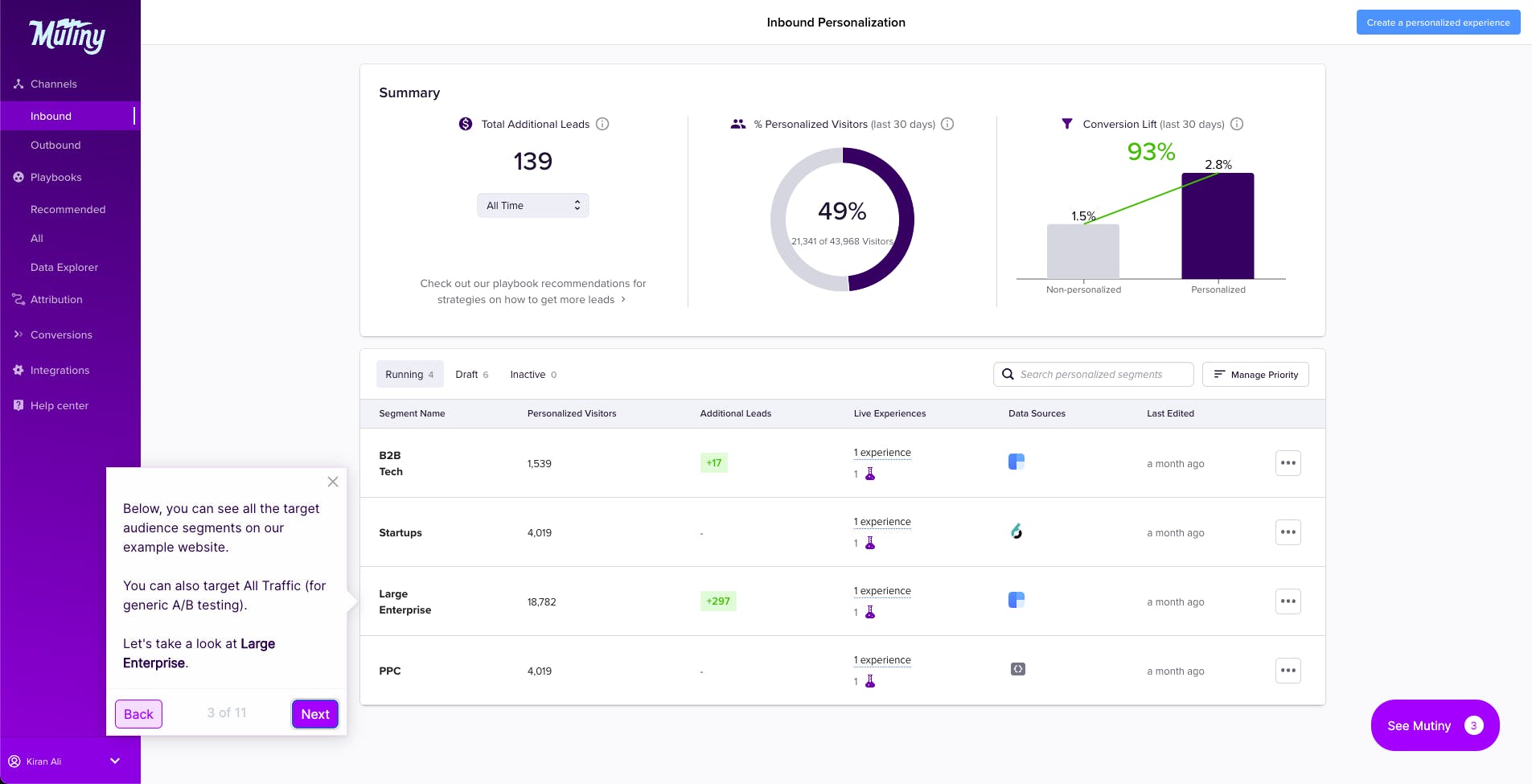
Source: Mutiny
Playbooks
Mutiny also has a library of recommended best practices called Playbooks. These best practices are based on machine learning and human expertise and are meant to help companies prioritize marketing efforts to drive results per business’s needs. Mutiny’s Playbooks are continually updated as Mutiny grows its data platform.
Following these guidelines, companies can avoid common mistakes and pitfalls and focus on what works. This results in significant time and cost savings and improved performance.
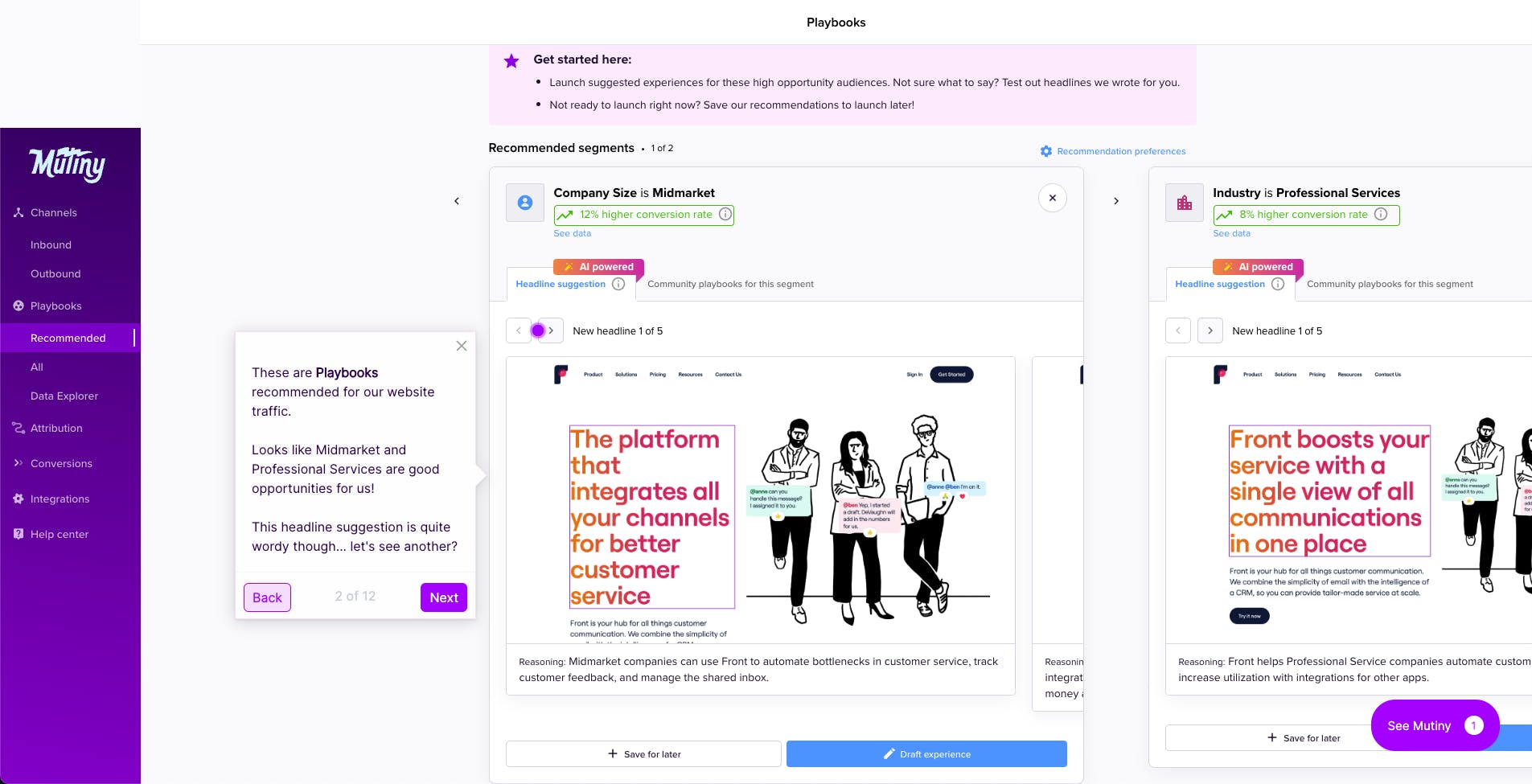
Source: Mutiny
Market
Customer
Mutiny’s initial customers were marketers at small to mid-market companies looking to optimize websites for customer conversion. It has expanded to enterprise clients since then, including companies like Hopin, Clearbit, Snowflake, Brex, and Notion.
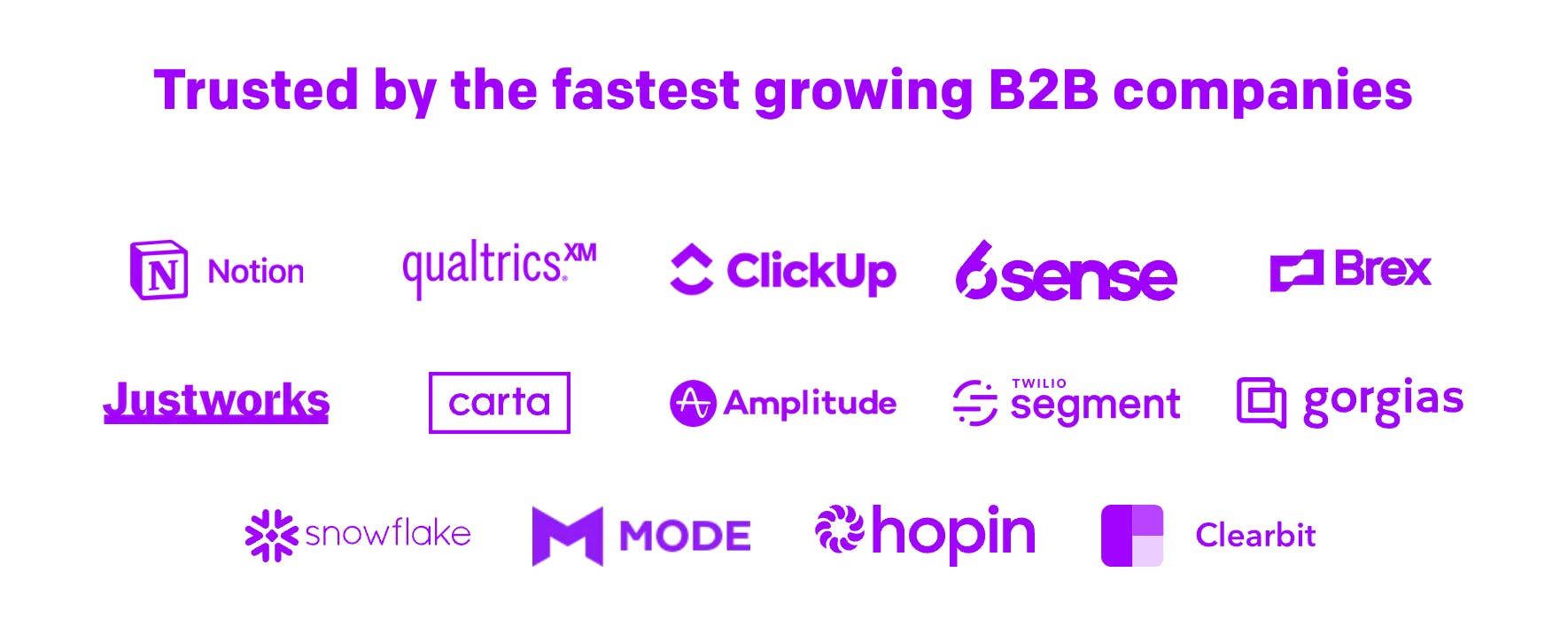
Source: Mutiny
Market Size
The global digital advertising market's value in 2022 was $65.3 billion and is projected to increase to $226.02 billion by 2030, registering a CAGR of 19.4% from 2023 to 2030. Enterprise has the largest share, holding over 50% of the market in 2022. According to a Gartner marketing survey, marketing budgets increased from 6.4% in 2021 to 9.5% in 2022 from total company revenues. While budgets have increased, companies are searching for ways to ensure marketing dollars are driving results.
Competition
Web Personalization
Intellimize and Constructor are Mutiny’s direct competitors in the web personalization category and have raised over $250 million and $60 million, respectively. Intellimize has a 4.9/5 rating on G2 as of January 2023 and was praised for its machine-learning algorithm. Constructor has a 4.8/5 rating on G2 and specializes in product recommendations and search results. Mutiny has a 4.7/5 rating on G2. As the application of AI evolves within marketing, the company with the greatest ability to personalize its web content in real-time will have a mounting advantage.
A/B Testing
A/B testing, also known as split testing, allows marketers to compare two versions of an ad or webpage to determine which performs better. Intellimize, Optimizely, and VWO are some of the most popular A/B testing platforms today. Marketers can run tests and measure how each version affects their target audience’s engagement with their product or service.
Customer Analysis
Understanding a customer's behaviors to anticipate needs and preferences is critical in marketing. Companies like Hotjar, Kissmetrics, and Segment help marketers better understand their target market and create more effective marketing strategies.
Business Model
Mutiny’s pricing for its SaaS subscription service is unavailable on its website. According to Scripted, it offers the Standard and Startup packages. The Standard package is for larger companies and costs between $1.5K - $2.2K per month for an annual contract. The Startup package is for small and medium-sized companies and costs between $300 and $650 per month depending on whether it's a monthly or annual term and the level of features included. Mutiny does not provide free trials because the services provided to customers are highly customized.
Traction
Mutiny disclosed that the company was at $2 million ARR in September 2021. Per the SaaS database Latka, Mutiny ended 2022 with a run rate of $4.9M. Rezaei shared that ~50 million people across 3 million companies have seen a website personalized by Mutiny. According to BuiltWith, 629 live websites are using it.
In October 2022, Mutiny went beyond its initial small and mid-sized customer base and acquired larger customers like Twilio, Brex, Carta, Notion, Slack, Snowflake, and DocSend. With the increase in 2022 marketing budgets, adding enterprise clients would likely have meant accelerated growth in revenue. In November 2022, Mutiny strategically acquired Intellipse, an AI marketing platform, to accelerate its roadmap.
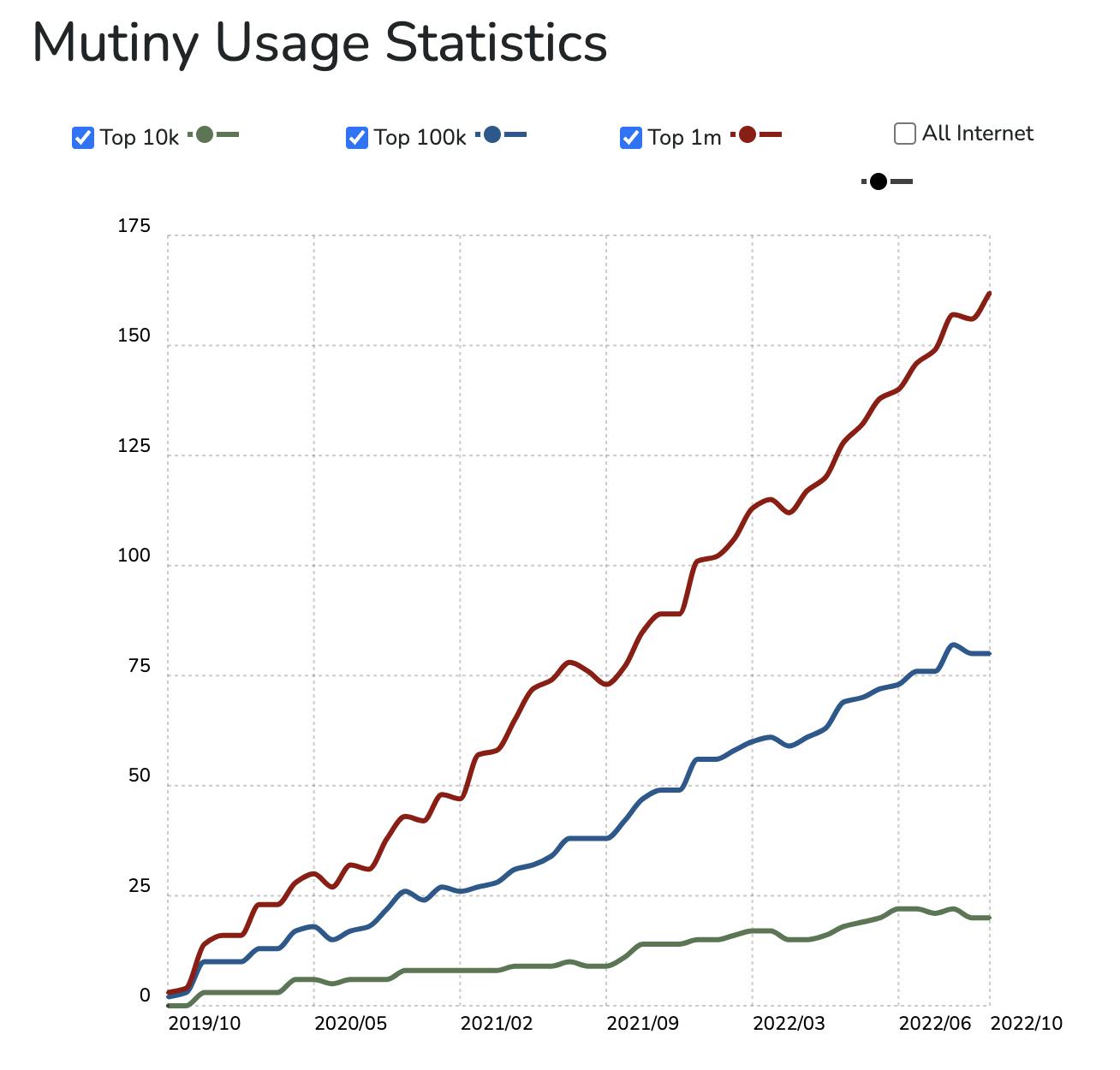
Source: Built With
Valuation
In April 2022, Mutiny announced a $50 million Series B at a $600 million post-money valuation, putting its total capital raise at $72 million. Investors include Uncork Capital, Tiger Global, Sequoia, Insight Partners, and Cowboy Ventures, along with executives from Uber, Visa, Salesforce, Square, Figma, Condé Nast, Carta, Snowflake, and Atlassian.
For comparison, in the public markets, valuations for sales and marketing, no-code, and AI companies have fallen from the beginning to the end of 2022. For example, HubSpot traded at ~20x LTM revenue in January 2022 before seeing that multiple fall to ~8x LTM revenue in December 2022.
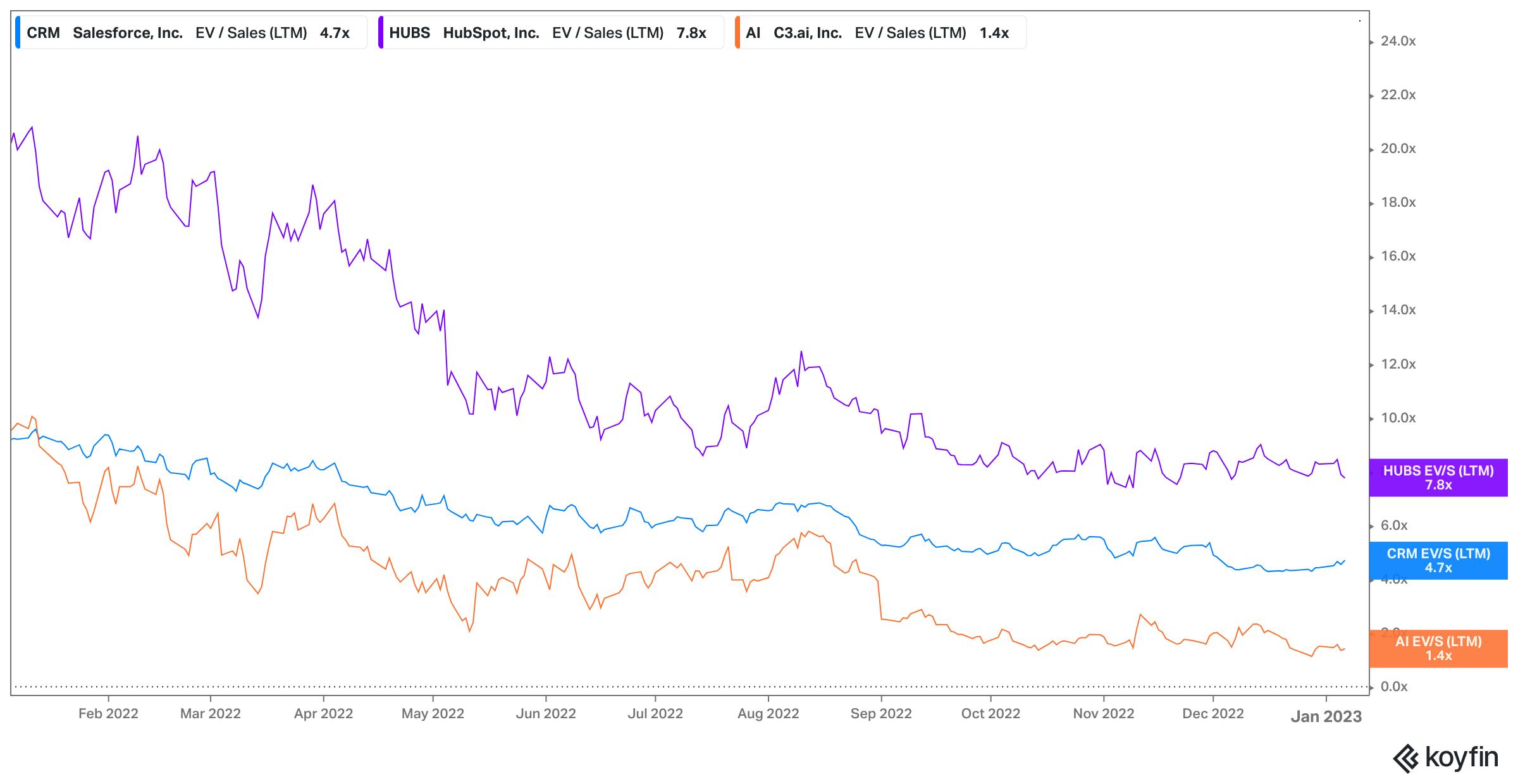
Source: Koyfin; as of January 8, 2023
Key Opportunities
Data Advantage
Mutiny’s platform is trained on over 500K web pages and stores valuable marketing data from its customers, including types of copy, headlines, and CTAs that convert site visitors from different market segments into paying customers. The company built the data sets from day one and has constantly fed its AI engine. It can suggest the best changes to make on a site, predict the impact of the changes, and recommend the next customer segment to go after as a result. Doubling down on this advantage to expand the scope and depth of use cases and recommendations is an exponential opportunity for growth.
Expanding Generative AI Use Cases
In 2021, Mutiny tapped GPT-3 for website headline generation to further help customers in website personalization utilizing its dataset of successful headlines. Mutiny has since expanded the use of generative AI for other areas on websites. This resulted in greater efficiency for customers, providing them with optimized content and CTAs.
While the textual copy is essential for website conversion, images and videos can be more powerful. There is opportunity in harnessing the power of ever-improving generative models to help with multi-media recommendations and optimizations to drive conversion results. Mutiny’s acquisition of Intellipse highlights its ambition to become the leader in its category using recent developments in AI.
Key Risks
Recession Risks
US-based tech companies cut 107K jobs in 2022, and another 21K workers were laid off in January 2023. Conversion rates are dependent on consumer spending, so if buyers are hesitant to spend money, this will affect Mutiny’s ability to convert customers from the top of the funnel to revenue. Deloitte predicts consumer spending to decrease from 2.7% growth in 2022 to 1.2% growth in 2023, representing a potential headwind that may negatively impact Mutiny’s growth potential.
Issues with Data Quality or Relevance
The ability of an AI platform to make accurate predictions is based on having enough relevant data to base decisions on. While AI has the potential to make marketing efforts more personalized, productive, and predictive, there are limitations, such as data availability and quality. According to Adam Long, VP of Product Management at Automated Insights:
“On a practical level, artificial intelligence is limited only by the availability of data. Because there’s a direct relationship between the richness of data and the capability of an artificial intelligence application, data becomes the key to an AI system.”
If Mutiny’s datasets are neither sufficient in quantity nor sufficiently relevant to continue driving effective personalization for customers, it may harm Mutiny’s value proposition.
Summary
Mutiny is a no-code AI platform for improving customer conversion rates. It empowers B2B marketers to customize websites based on target personas and makes marketing more targeted, predictive, and effective. While a macroeconomic downturn could impact customer spending, Mutiny’s capability to replace growth teams with tools will help its customers save money while executing marketing campaigns and could be seen as an increasingly necessary tool for resource-constrained companies looking to get the most out of their marketing budgets.


